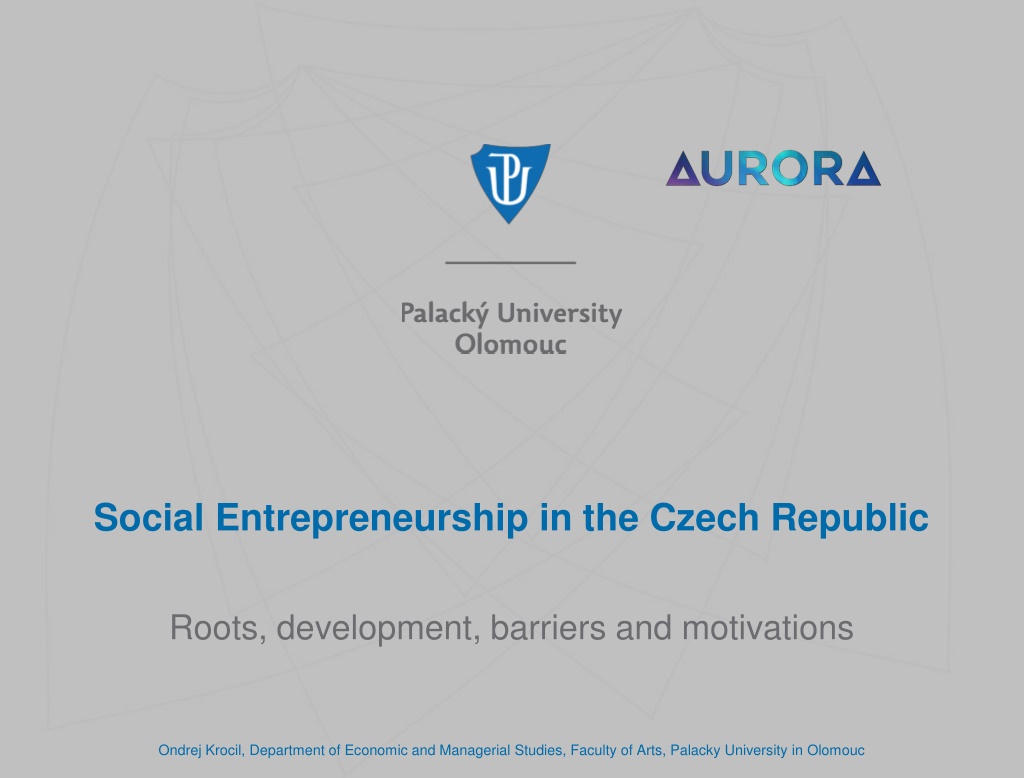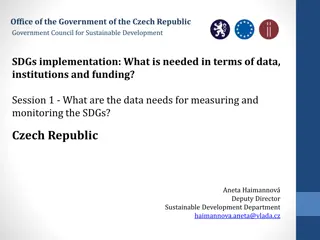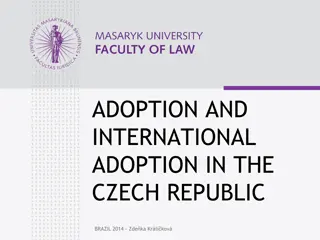Social Entrepreneurship in the Czech Republic: Roots, Development, and Current Status
Roots of social entrepreneurship in the Czech Republic trace back to solidarity values pre-transition to a market economy. Suppressed under communist regimes, resurgence post-transition faced challenges due to lack of institutional framework. Presently, the Czech Republic lacks specific legislation and strategy for social entrepreneurship, with 177 social enterprises listed. Profile of Czech social enterprises mainly comprises WISE organizations focusing on employing people with disabilities, primarily in food processing, gastronomy, and maintenance sectors. EMES research network offers a multidimensional approach to social entrepreneurship.
Download Presentation

Please find below an Image/Link to download the presentation.
The content on the website is provided AS IS for your information and personal use only. It may not be sold, licensed, or shared on other websites without obtaining consent from the author. Download presentation by click this link. If you encounter any issues during the download, it is possible that the publisher has removed the file from their server.
E N D
Presentation Transcript
Social Entrepreneurship in the Czech Republic Roots, development, barriers and motivations Ondrej Krocil, Department of Economic and Managerial Studies, Faculty of Arts, Palacky University in Olomouc
Roots of social entrepreneurship in the Czech Republic Solidarity and collectivistic values were present in the philanthropic, associative and cooperative tradition prior to transition to a market economy They were suppressed under communist regimes and, following transition, suffered from the absence of an institutional framework, which had been severely weakened over the years Interest in defining the social economy and its actors has been apparent since the early 2000s
Current development of social entrepreneurship in the Czech Republic Unlike in other European countries, social entrepreneurship has still not been included in Czech legislation and the Czech Republic lacks a specific strategy for the development of social entrepreneurship According to the directory of social enterprises managed by the Ministry of Labor and Social Affairs (2021), there are currently 177 social enterprises operating in the Czech Republic Because there is no legal register of social enterprises, the directory is currently the only source providing an overview of the number and location of Czech social enterprises
Current development of social entrepreneurship in the Czech Republic Profile of Czech SE: Mostly WISE (95 %) people with disabilities Compared to other groups of people disadvantaged in the labour market, the employment of people with disabilities receives in the national legislation more attention - reasons for the orientation of Czech WISE towards the integration of people with disabilities Operate mainly in the areas of food processing, gastronomy and maintenance work In terms of size, these are mostly micro and small enterprises
Current development of social entrepreneurship in the Czech Republic EMES approach: About EMES: a research network of university research centers and individual researchers on social entrepreneurship EMES approchas to SE 3 dimensions (Defourny, Nyssens, 2012): Economic and Entrepreneurial Dimension Social Dimension Participatory Governance Dimension EMES approach implemented by TESSEA (an umbrella organization for Czech social enterprises)
Barriers to the development of Czech SE The lack of legislation and systemic support from the state The low civic engagement in the Czech Republic The Czech Republic is an example of a former socialist country where values of cooperation and social justice have been discredited during socialism and the low levels of trust, social consciousness, activism and poor entrepreneurial skills and inclination jeopardise the capacity of citizens to self-organise (Borzaga et al., 2020)
Barriers to the development of Czech SE Complicated environment for businesses including heavy administrative load especially for SMEs Missing systemic education and support of social enterprise practitioners x the existence of an umbrella organization Little public recognition of social enterprises Lack of interest of banks in increasing the availability of loans for the underdeveloped sector of social enterprises
Motivation of Czech social entrepreneurs Altruism: To provide help to people with disabilities Felt the need to help Morality: Their philosophy of life Social entrepreneurship fulfils them morally and spiritually, and it s possible to make a living from something that is both fun and at the same time beneficial
Motivation of Czech social entrepreneurs Sustainability: They don t want to participate in the destruction of our planet The importance of environmental sustainability and the idea of circular economics Family instinct: Life events and personal experience They started SE to employ a disabled child or household member
Motivation of Czech social entrepreneurs Autonomy Competence Relatedness: Many social entrepreneurs are recruited from people who run traditional, purely profit-oriented businesses Managing such profit-based companies is often a good experience, it can be more financially interesting, but over time, mental fatigue sets in and satisfaction from this activity is lost Social entrepreneurs describe that social entrepreneurship brings greater satisfaction and leads to a feeling of happiness from fulfilling social goals
Motivation of Czech social entrepreneurs Self-interest: Several social entrepreneurs were motivated to enter social entrepreneurship by their financial gain: Thanks to state subsidies, the total wage costs would be even lower than that of two healthy employees Entrepreneur s previous work was poorly perceived by the public and with low salaries
Sources Borzaga, C. et al. (2020). Social Enterprises and Their Ecosystems in Europe. European Commission Defourny, J., Nyssens, M. (2012). The EMES approach of social enterprise in a comparative perspective. EMES European Research Network P lucha, M., Kou ilov , J. & Kv to , V. (2017). Barriers of Social Entrepreneurship Development A Case Study of the Czech Republic. Journal of Social Entrepreneurship, 8(2), 129 148. Fra kov , E. (2019). Social Enterprises and their Ecosystems in Europe. Country Report: Czech Republic. Available from: https://www.euricse.eu/social-enterprises-and-their- ecosystems-in-europe-mapping-study/ Sad lek, T., Kro il, O. & M ller, M. (2022). What Motivates Czech Social Entrepreneurs? A Qualitative Study from an Unfavourable Social Entrepreneurship Environment. Nonprofit Management & Leadership. In press.
Discussion How do the barriers to the development of social entrepreneurship in Macedonia differ from those in the Czech Republic? Is the conceptualization of social entrepreneurship in Macedonia similar or different in comparison with the Czech conceptualization? What is the profile of a typical social entrepreneur in Macedonia?























